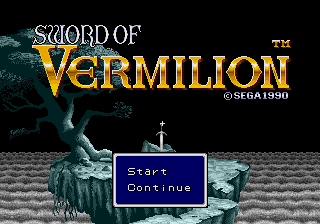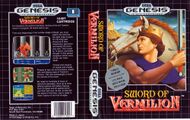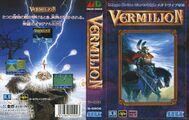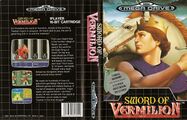Sword of Vermilion
From Sega Retro
This short article is in need of work. You can help Sega Retro by adding to it.
| Sword of Vermilion | |||||||||||||||||||||||||||||||||||||||||||||
|---|---|---|---|---|---|---|---|---|---|---|---|---|---|---|---|---|---|---|---|---|---|---|---|---|---|---|---|---|---|---|---|---|---|---|---|---|---|---|---|---|---|---|---|---|---|
| System(s): Sega Mega Drive, Virtual Console, Steam | |||||||||||||||||||||||||||||||||||||||||||||
| Publisher: Sega | |||||||||||||||||||||||||||||||||||||||||||||
| Developer: Sega AM2 | |||||||||||||||||||||||||||||||||||||||||||||
| Genre: RPG | |||||||||||||||||||||||||||||||||||||||||||||
| Number of players: 1 | |||||||||||||||||||||||||||||||||||||||||||||
| |||||||||||||||||||||||||||||||||||||||||||||
|
CERO
Missing Parameter! |
Sword of Vermilion, known as Vermilion (ヴァーミリオン) in Japan, is an action RPG game developed by Sega under Yu Suzuki and released for the Sega Mega Drive in late 1989. It was brought to English-speaking nations in 1991 where it shipped with a 106-page hint book.
Contents
Plot
Erik V, king of Excalabria, is overthrown by Tsarkon, king of Cartahena. Before he dies, Erik tells his most trusted servant, Blade, to take his infant son and the family heirloom, the Ring of Wisdom, and escape, raising the baby as his own. Eighteen years later, Tsarkon's forces approach Wyclif, the town where Blade took the baby, requiring Blade to reveal the boy's true identity as Prince of Excalabria and sending him off to save the land by collecting a series of rings starting with the Ring of Wisdom.
Gameplay
Areas
You control the Prince in four different ways, depending on where you are:
Towns
When in towns, the game takes a top-down view. ![]() opens the menu (described below). You may only enter buildings whose doors are open. Each town might have any of the following buildings: a church (where you can get cured of poison and curses and can save your game), a weapon shop (selling weapons, shields, and armor), a tavern (which does not appear to sell anything), an inn (where you may rest), an equipment shop (which sells consumable items), and a fortune teller's building. Furthermore, one NPC in each town will usually give you a map of an area in the overworld when you talk to him. Each town has a building (for instance, with Parma, the castle) where you must go and talk to someone (with Parma, the King) who will tell you how to get the next ring.
opens the menu (described below). You may only enter buildings whose doors are open. Each town might have any of the following buildings: a church (where you can get cured of poison and curses and can save your game), a weapon shop (selling weapons, shields, and armor), a tavern (which does not appear to sell anything), an inn (where you may rest), an equipment shop (which sells consumable items), and a fortune teller's building. Furthermore, one NPC in each town will usually give you a map of an area in the overworld when you talk to him. Each town has a building (for instance, with Parma, the castle) where you must go and talk to someone (with Parma, the King) who will tell you how to get the next ring.
Overworld/Dungeons
In the overworld and dungeons, the screen splits, with a 3D perspective on the left screen and a map on the right, with some status information on the bottom. ![]() and
and ![]() move forward and backward;
move forward and backward; ![]() and
and ![]() turn 90° in the particular direction, and
turn 90° in the particular direction, and ![]() opens the menu. The map on the right will only show what is immediately visible to you unless you have a map (and in the case of dungeons, which are dark by default, a light). Along the way, you will be stopped randomly by enemies who will take you into battle, find people who you can talk to, and find chests you can open for items, the latter usually placed in dead ends.
opens the menu. The map on the right will only show what is immediately visible to you unless you have a map (and in the case of dungeons, which are dark by default, a light). Along the way, you will be stopped randomly by enemies who will take you into battle, find people who you can talk to, and find chests you can open for items, the latter usually placed in dead ends.
Battles
Battles take place in a top-down area the size of the screen. You always start facing down at the center of the battlefield, regardless of how many enemies there are and where they are, so act fast! ![]() uses your sword, which you must have equipped beforehand from the menu.
uses your sword, which you must have equipped beforehand from the menu. ![]() uses the battle magic that you have readied beforehand from the Magic menu. Each enemy you kill gains you money, called "kims", and experience points. The battle ends when you either die, walk out the left/right sides, or kill all enemies on screen. If you are killed, you will be restored at a church, and the pontiff will take half your money for the poor.
uses the battle magic that you have readied beforehand from the Magic menu. Each enemy you kill gains you money, called "kims", and experience points. The battle ends when you either die, walk out the left/right sides, or kill all enemies on screen. If you are killed, you will be restored at a church, and the pontiff will take half your money for the poor.
Archmonster battles
When fighting an arhcmonster, which are bosses of this game, the battle will take place from a 2D side perspective. ![]() moves you forward,
moves you forward, ![]() moves you backward,
moves you backward, ![]() makes you duck and
makes you duck and ![]() swings the sword, the attack can also destroy certain projectiles. You can't escape or use magic during archmonster battles so it's a fight until either player or arhcmonster dies.
swings the sword, the attack can also destroy certain projectiles. You can't escape or use magic during archmonster battles so it's a fight until either player or arhcmonster dies.
Menu
When not in a battle, press ![]() to open the menu. You have eight options:
to open the menu. You have eight options:
- Talk: talk to a person you are immediately next to/in front of/behind
- Item: use or discard collected items
- Str: show incremental screens of status;
 shows the next screen
shows the next screen - Open: open treasure chests and doors
- Magic: cast, prepare, or discard magic spells
- Equip: put on, take off, or discard weapons, shields, and armor
- Seek: look around for unusual things
- Take: take an item from the opened treasure chest
![]() makes a selection.
makes a selection. ![]() at any time exits first a submenu, then the whole menu.
at any time exits first a submenu, then the whole menu.
Pressing START opens another menu where you may choose how fast you want dialogue to appear.
History
Legacy
The game was re-released as part of Sega Mega Drive Collection for the PlayStation 2 and PlayStation Portable. It was also released for the Nintendo Wii's Virtual Console in Japan on 27 Febuary 2007, Europe on 1 March 2007 and North America on 5 March 2007. It was also released as part of Sega Mega Drive Classic Collection Volume 3 for Windows and is available for separate purchase on Steam.
The game has a Japanese guide book in the form of Vermilion Attack Manual Book. It also would receive a soundtrack in 2009 as Vermilion vs Rent A Hero Original Soundtrack, which also contains music from Rent A Hero.
Production credits
- Director: Sada
- Scenario Writer: Namako
- Game Design: Sada, Namako, Madoka
- Chief Programer: Madoka
- Chief Designer: Key
- Main Program: Madoka, Namako
- Program: Bin, Zeas-Q, Lalf2
- Sound Program:
- Background Design: Key
- Player Design: Gudon
- Boss Design: Gudon, Papa
- Enemy Design: Gudon, Papa, Robo
- Opening Design: Jiji
- Title Design: Key
- ASCII Design: Key
- Map Design: Sada, Namako
- Map Edit: Coma, Lucy
- Sound (BGM): Hiro, Yas
- Sound (Effect): Yas
- Game Check: Dog
- Manual Write: Madoka, Namako
- Player: (player's name)
- Producer: Yu Suzuki
- Special Thanks: Yu, Bin
Magazine articles
- Main article: Sword of Vermilion/Magazine articles.
Promotional material
also published in:
- Electronic Gaming Monthly (US) #15: "October 1990" (1990-xx-xx)[2]
- GamePro (US) #15: "October 1990" (1990-xx-xx)[3]
- VideoGames & Computer Entertainment (US) #21: "October 1990" (1990-xx-xx)[4]
also published in:
- GamePro (US) #16: "November 1990" (1990-xx-xx)[5]
- Game Players Sega Guide! (US) #0101: "Vol. 1, No. 1: Fall 1990" (1990-10-xx)[6]
- Sega Visions (US) #3: "Winter 1990/1991" (1990-xx-xx)[7]
Digital manuals
Physical scans
| Sega Retro Average | |||||||||||||||||||||||||||||||||||||||||||||||||||||||||||||||||||||||||||||||||||||||||||||||||||||||||||||||||||||||||||||||||||||||||||||||||||||||||||||||
|---|---|---|---|---|---|---|---|---|---|---|---|---|---|---|---|---|---|---|---|---|---|---|---|---|---|---|---|---|---|---|---|---|---|---|---|---|---|---|---|---|---|---|---|---|---|---|---|---|---|---|---|---|---|---|---|---|---|---|---|---|---|---|---|---|---|---|---|---|---|---|---|---|---|---|---|---|---|---|---|---|---|---|---|---|---|---|---|---|---|---|---|---|---|---|---|---|---|---|---|---|---|---|---|---|---|---|---|---|---|---|---|---|---|---|---|---|---|---|---|---|---|---|---|---|---|---|---|---|---|---|---|---|---|---|---|---|---|---|---|---|---|---|---|---|---|---|---|---|---|---|---|---|---|---|---|---|---|---|---|
|
| 78 | |
|---|---|
| Based on 31 reviews | |
| Mega Drive, CA |
|---|
|
External links
References
- ↑ File:Raze UK 05.pdf, page 75
- ↑ Electronic Gaming Monthly, "October 1990" (US; 1990-xx-xx), page 69
- ↑ GamePro, "October 1990" (US; 1990-xx-xx), page 73
- ↑ VideoGames & Computer Entertainment, "October 1990" (US; 1990-xx-xx), page 39
- ↑ GamePro, "November 1990" (US; 1990-xx-xx), page 100
- ↑ Game Players Sega Guide!, "Vol. 1, No. 1: Fall 1990" (US; 1990-10-xx), page 8
- ↑ Sega Visions, "Winter 1990/1991" (US; 1990-xx-xx), page 22
- ↑ File:BeepMD_JP_1990-02.pdf, page 69
- ↑ File:SSM_JP_19950901_1995-09.pdf, page 87
- ↑ 10.0 10.1 File:CVG UK 115.pdf, page 114 Cite error: Invalid
<ref>tag; name ":File:CVG UK 115.pdf_p114" defined multiple times with different content - ↑ 11.0 11.1 File:MeanMachines UK 08.pdf, page 64 Cite error: Invalid
<ref>tag; name ":File:MeanMachines UK 08.pdf_p64" defined multiple times with different content - ↑ 12.0 12.1 File:Raze UK 05.pdf, page 74 Cite error: Invalid
<ref>tag; name ":File:Raze UK 05.pdf_p74" defined multiple times with different content - ↑ 13.0 13.1 File:SegaPro UK 06.pdf, page 30 Cite error: Invalid
<ref>tag; name ":File:SegaPro UK 06.pdf_p30" defined multiple times with different content - ↑ 1700 igr dlya Sega, "" (RU; 2001-xx-xx), page 233
- ↑ Aktueller Software Markt, "März 1991" (DE; 1991-02-22), page 124
- ↑ Beep! MegaDrive, "February 1990" (JP; 1990-01-08), page 69
- ↑ Console XS, "June/July 1992" (UK; 1992-04-23), page 135
- ↑ Electronic Gaming Monthly, "January 1991" (US; 199x-xx-xx), page 22
- ↑ Mean Machines: The Essential Sega Guide, "" (UK; 1993-11-18), page 103
- ↑ Famitsu, "" (JP; 1989-xx-xx), page 1
- ↑ Game Informer, "July 1999" (US; 1999-0x-xx), page 80
- ↑ Joystick, "Novembre 1990" (FR; 1990-1x-xx), page 118
- ↑ Sega Mega Drive Advanced Gaming, "January 1993" (UK; 199x-xx-xx), page 63
- ↑ Mega Drive Fan, "May 1990" (JP; 1990-04-07), page 89
- ↑ Mega, "April 1994" (UK; 1994-03-17), page 71
- ↑ Mega Play, "February 1991" (US; 199x-xx-xx), page 41
- ↑ MegaTech, "Xmas 1991" (UK; 1991-12-06), page 30
- ↑ Mean Machines Sega, "October 1992" (UK; 1992-09-xx), page 142
- ↑ Player One, "Mars 1991" (FR; 1991-xx-xx), page 45
- ↑ Play Time, "6/92" (DE; 1992-05-06), page 94
- ↑ Power Play, "3/91" (DE; 1991-02-15), page 138
- ↑ Sega Power, "July 1991" (UK; 1991-06-06), page 10
- ↑ Sega Power, "October 1991" (UK; 1991-09-05), page 54
- ↑ Sega Power, "December 1991" (UK; 1991-10-30), page 47
- ↑ Sega Pro, "April 1993" (UK; 1993-03-11), page 68
- ↑ Sega Saturn Magazine, "September 1995" (JP; 1995-08-08), page 87
- ↑ Tilt, "Décembre 1991" (FR; 1991-1x-xx), page 52
- ↑ Tricks 16 bit, "Tricks Sega Gold 800 igr" (RU; 1998-03-20), page 26
- ↑ VideoGames & Computer Entertainment, "November 1990" (US; 1990-1x-xx), page 52
- ↑ Video Games, "1/91" (DE; 1991-03-27), page 90
- Pages with reference errors
- Stubs
- 1 player games
- JP Mega Drive games
- All JP games
- US Mega Drive games
- All US games
- UK Mega Drive games
- All UK games
- AU Mega Drive games
- All AU games
- CA Mega Drive games
- All CA games
- Mega Drive games
- 1989 Mega Drive games
- All 1989 games
- Mega Drive RPGs
- All RPGs
- JP Wii Virtual Console games
- US Wii Virtual Console games
- EU Wii Virtual Console games
- All EU games
- Wii games
- 2007 Wii games
- All 2007 games
- Wii Virtual Console games
- Old content rating field
- Use romtable template
- All games
- Credits without reference
- GalleryPrintAd file defined
- Old-style rating (bemega)
- Use magref
- Old-style rating (bemega r)
- Old-style rating (cvg)
- Old-style rating (famitsu)
- External rating reference
- Old-style rating (joystick)
- Rating without PDF source
- Old-style rating (mdag)
- Old-style rating (mega)
- Old-style rating (megatech)
- Old-style rating (mm)
- Old-style rating (playerone)
- Old-style rating (pp)
- Rating without source
- Old-style rating (raze)
- Old-style rating (segapower)
- Old-style rating (segapro)
- Update ratings template
- 19 old ratings
- Sega Channel games






